Company Updates
A Hot Take on America’s Favorite Hot Sauces 🌶
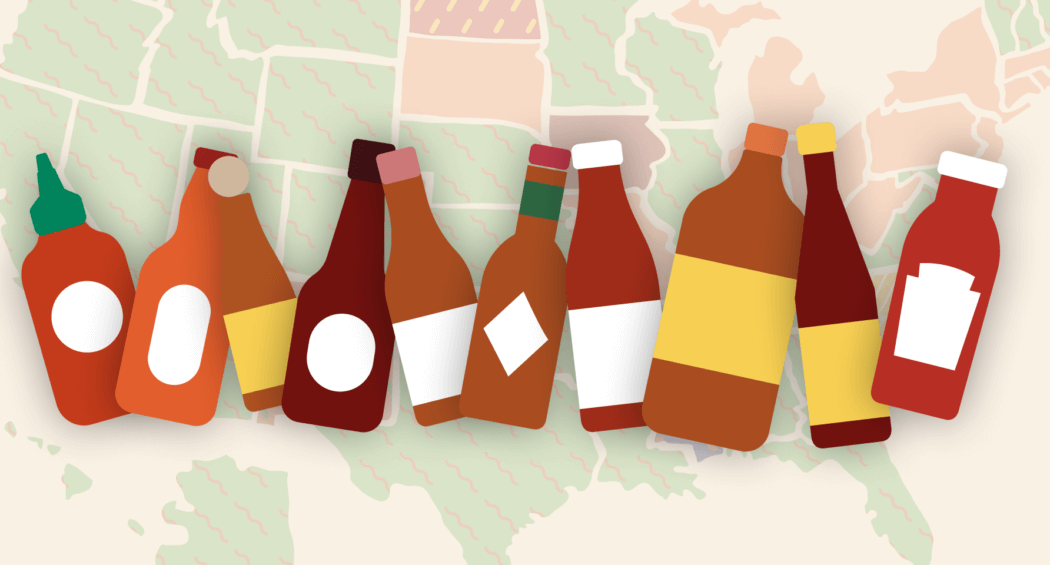
One thing is certain when it comes to Americans’ food preferences — everything is better with hot sauce. From sandwiches and burritos to soups and eggs, these foods and many more in between are arguably better with a little heat. According to a recent Instacart survey conducted online by The Harris Poll among over 2,000 U.S. adults, 74% of Americans eat hot sauce with their food, and nearly half (45%) said they typically dash hot sauce on their food once a week or more often. What’s more, among those who use hot sauce, 67% say they are passionate about their favorite brand — suggesting they will go to bat for their favorite spicy sauce. With National Hot Sauce Day approaching on January 22, we conducted a deep dive using Instacart purchase and survey data to uncover America’s hot sauce preferences.
America’s spiciest debate: which hot sauces reign supreme?
Using Instacart purchase data, we identified the top purchased hot sauce in each U.S. state, which gave us a few surprises. Huy Fong, the makers of the famous “rooster sauce” Sriracha, is the top hot sauce in 31 states including nearly the entire western region, followed by Frank’s RedHot in 14 states located primarily in the Midwest and Northeast. Texas Pete is number one in the Carolinas — and surprisingly not Texas — and Original Louisiana hot sauce takes the top spot in Mississippi instead of its namesake of Louisiana. Staying true to local roots, Village Hot Sauce from Grand Forks, North Dakota is the most popular hot sauce in the state while New Mexico favors the green and red chili heat from local, family-owned Bueno. Lastly, Iowa stands alone when it comes to its hot sauce preference for Burman’s hot sauce.
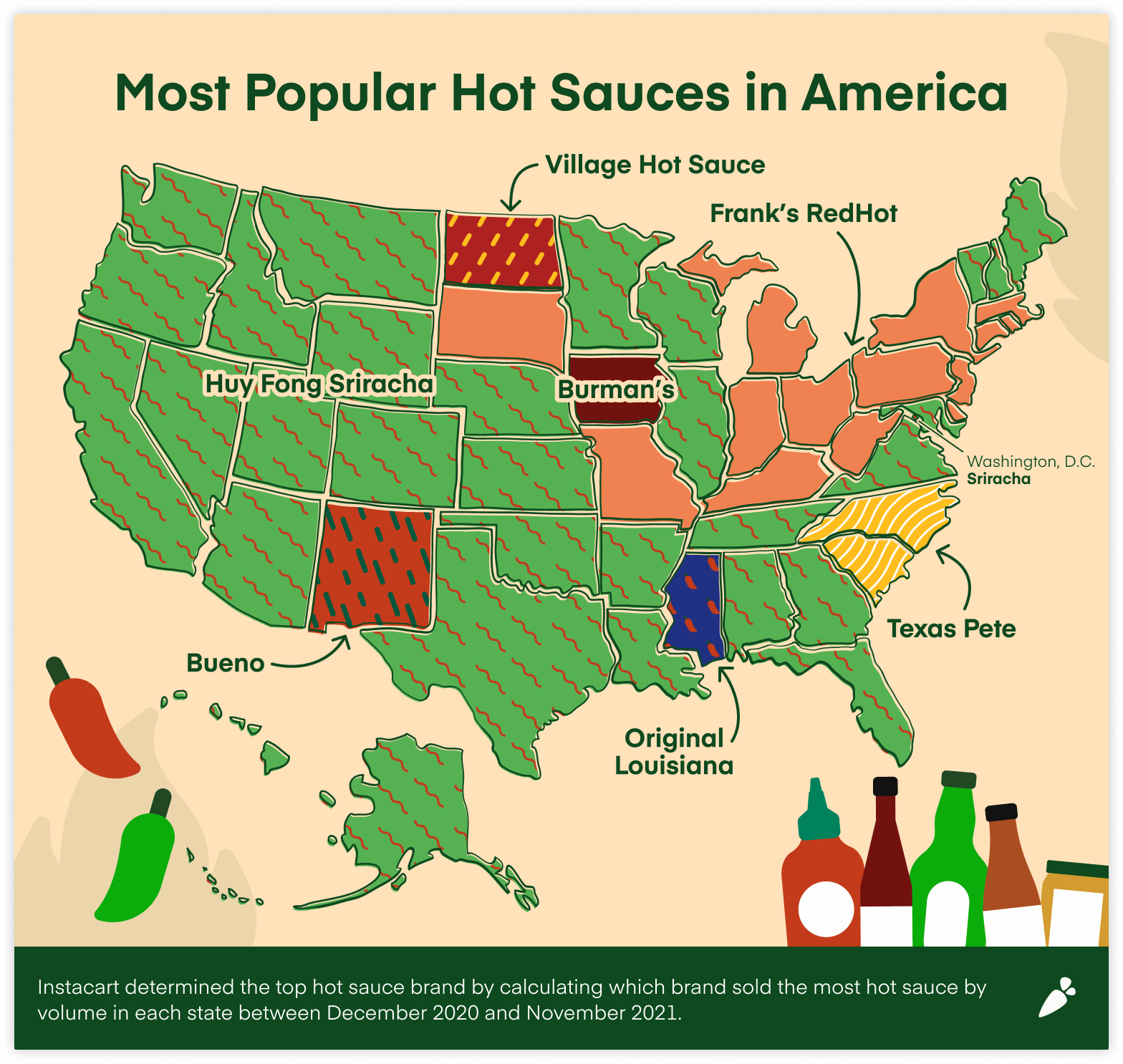
Based on the top hot sauce in each state insight, it may not come as a surprise that Huy Fong Sriracha and Frank’s RedHot top the list as the #1 and #2 hot sauces sold via Instacart by weight. Outside of those two hot sauce behemoths, here are the other spicy sauces Americans love to use to heat things up:
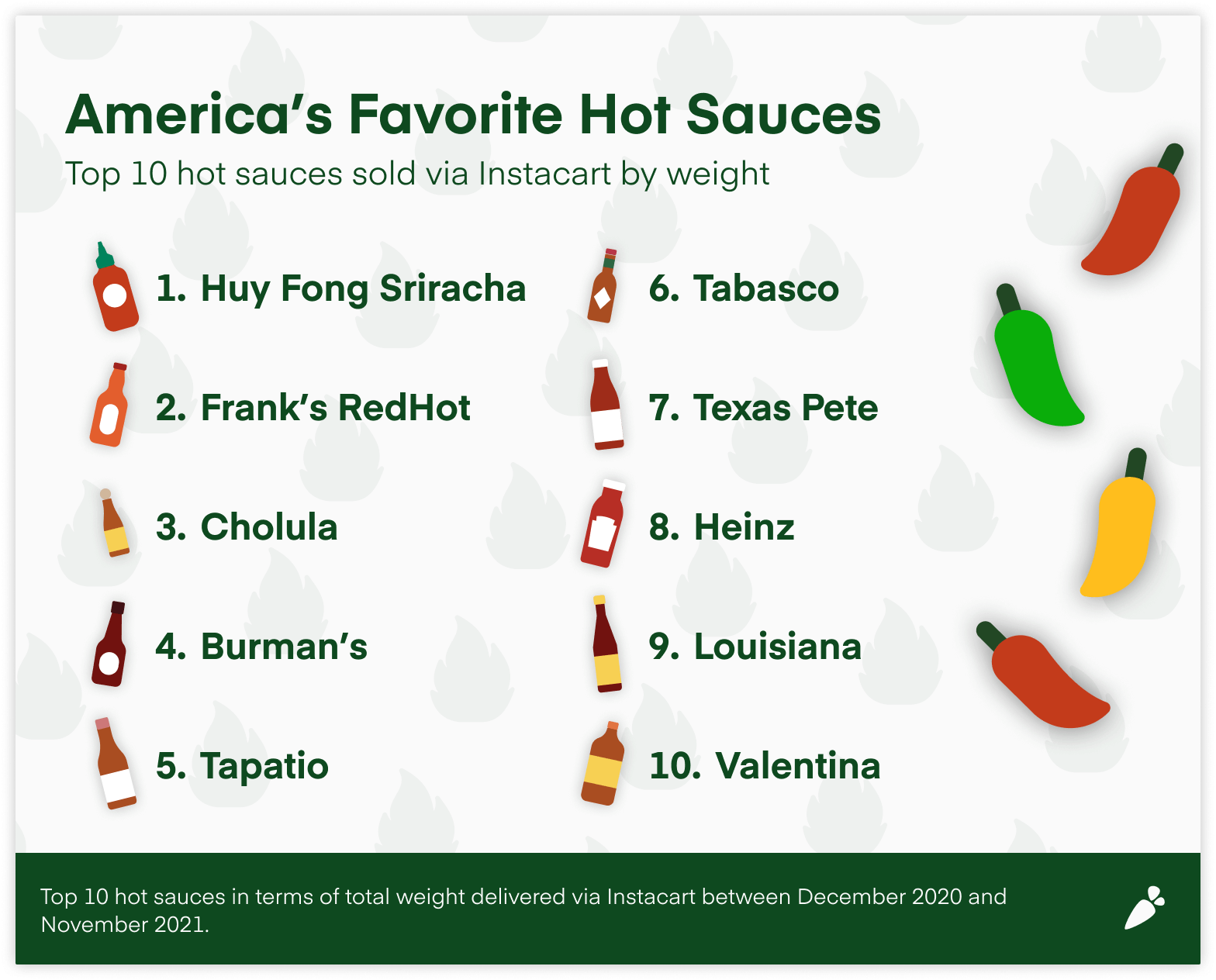
Getting hot, hot, hot in the spiciest states
Instacart customers buy a lot of hot sauce. Between December 2020 and November 2021, Instacart customers purchased 444,854 gallons of hot sauce. To put that into perspective, that’s enough hot sauce to fill 18,536 kiddie pools. With that said, some states do have a bigger hankering for spicy foods. Check out Instacart’s heat map that shows which states purchase the most hot sauce on the Instacart platform.
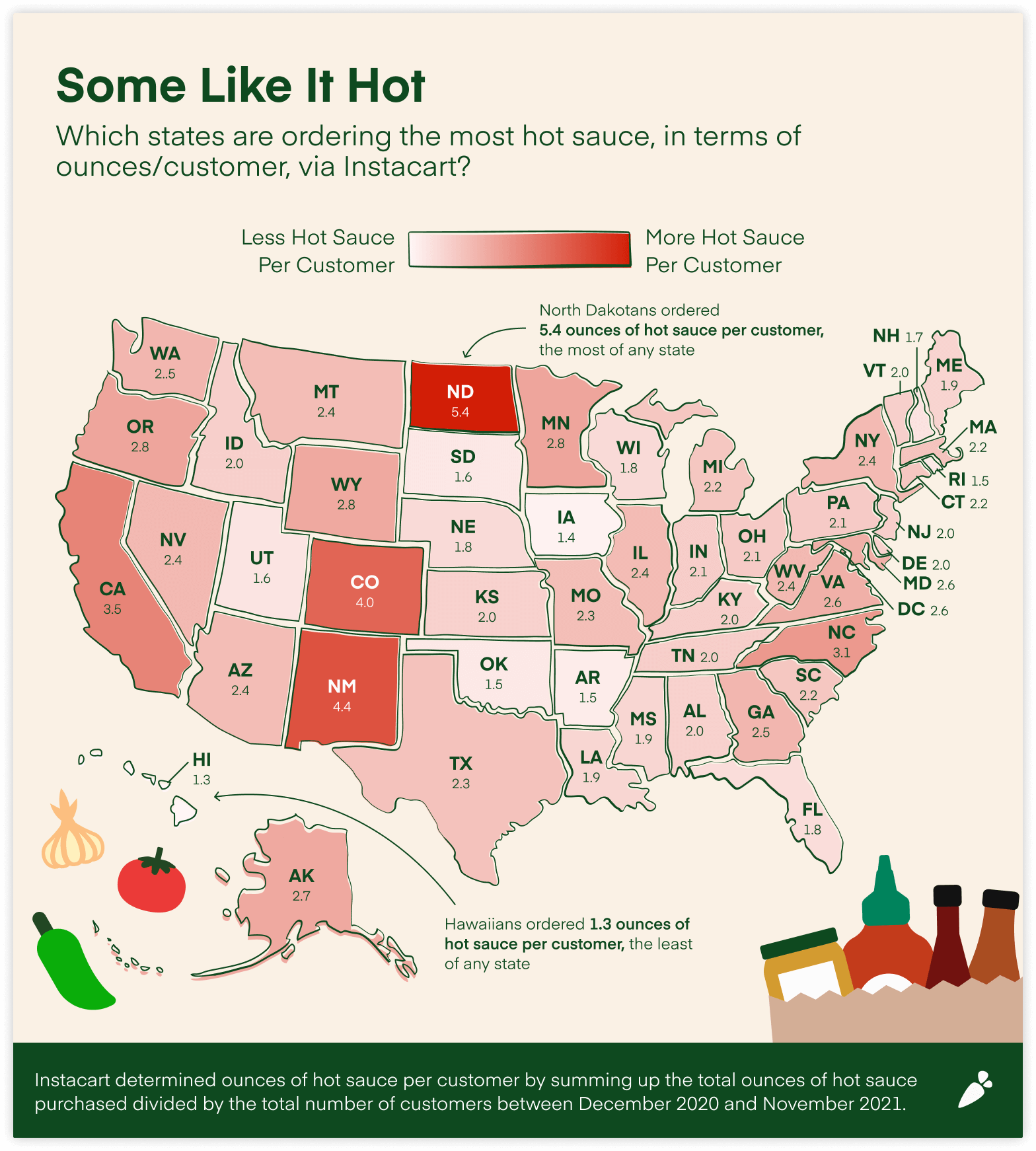
According to the hot sauce heat map, these states buy the most hot sauce to keep things spicy:
- North Dakota (5.4 ounces/customer)
- New Mexico (4.4 ounces/customer)
- Colorado (4.0 ounces/customer)
- California (3.5 ounces/customer)
- North Carolina (3.1 ounces/customer)
Meanwhile, people living in these states don’t prefer as much heat and buy the least amount of hot sauce in the country:
- Hawaii (1.3 ounces/customer)
- Iowa (1.4 ounces/customer)
- Arkansas (1.5 ounces/customer)
- Oklahoma (1.5 ounces/customer)
- Rhode Island (1.5 ounces/customer)
Here’s an even closer look at some of the ‘hottest’ findings when it comes to Americans’ hot sauce preferences, according to our Harris Poll survey:
- Most of us like it hot. More than half (59%) of hot sauce eaters typically prefer the heat level of their hot sauce to be hot, with 46% preferring “regular hot” hot sauce and 14% opting for “as hot as it gets.”
- Variety is the spice of life. More than two-thirds (68%) of hot sauce eaters currently have two or more different brands of hot sauce at home, and 80% use different hot sauce brands and/or flavors with different types of food. Because who doesn’t prefer Cholula on their tacos and Frank’s RedHot on their wings?!
- New spicy frontiers. Let’s not confuse passion with loyalty — 83% of hot sauce eaters are either very or somewhat open to trying hot sauce brands that are new to the market, and 71% are either very or somewhat likely to purchase something new over their favorite hot sauce brand.
- Trend alert! “Over the past year, we’ve noticed that hot sauce enthusiasts are reaching for newer brands like Maya Kaimal and TRUFF, which top the list for Instacart’s fastest-growing hot sauce brands,” said Laurentia Romaniuk, Instacart’s Trends Expert. “These newer brands are likely gaining traction among hot sauce enthusiasts because they offer up unique flavor profiles that also pack a punch, incorporating everything from truffles to traditional Indian spices. With many hot sauce lovers willing to go to Scoville extremes, it’s no surprise they’re also branching out and becoming more adventurous when it comes to discovering new flavor options.”
- Non-traditional hot sauce pairings. Not surprisingly, tacos (66%), burritos (60%), and meat (57%) top the list of foods that hot sauce eaters say they like to put hot sauce on. However, the non-traditional foods that caught our attention include chips (30%), popcorn (17%), and ice cream (8%). Tapatio with vanilla ice cream, anyone?
- Heating up when the sun goes down. Not all meals are created equal when it comes to adding hot sauce, with 81% of hot sauce eaters eating hot sauce at dinner and only 24% eating hot sauce during breakfast.
‘Tis the season for hot sauce!
According to Instacart insights, customers purchase hot sauce regularly throughout the year, but there is one moment in time where hot sauce purchases peak: during football’s biggest game in February. Last year, hot sauce sales spiked by 45% during the week ending on the big game day compared to the rest of the year. On top of that, Instacart has also noticed a year-over-year increase in the amount of hot sauce purchased during the week of the big game. In 2021, customers purchased 11.7% more hot sauce per customer than in 2020, and 21.6% more than in 2019.
The timing of National Hot Sauce Day on January 22 is fairly punctual considering the big game follows just a few weeks after. Let’s bring on the heat! 🔥🌶
Instacart Data Methodology:
All sales and trend insights are from Instacart platform-wide data between December 2020 and November 2021.
Survey Methodology:
This survey was conducted online within the United States by The Harris Poll on behalf of Instacart from December 20-22, 2021, among 2,025 adults ages 18+, among whom 1,422 eat hot sauce. This online survey is not based on a probability sample and therefore no estimate of theoretical sampling error can be calculated. For complete survey methodology, including weighting variables and subgroup sample sizes, please contact [email protected].
Adjusting for Growth:
We adjust Instacart growth percentages by the overall growth of total deliveries. Doing so removes the influence of our platform growth so we can focus on the change in consumer behavior.
Most Recent in Company Updates
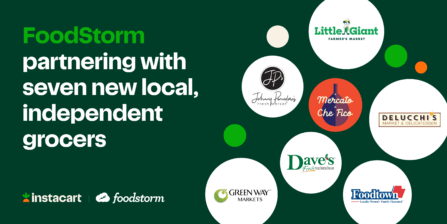
FoodStorm
Helping Local Independent Grocers Streamline Their Catering and Prepared Foods Businesses
Over the past few years, FoodStorm - our order management system (OMS) designed specifically to help grocers manage their deli, prepared foods and catering - has seen remarkable growth. And today, we’re excited to share…...
Apr 24, 2024
Company Updates
Making Nutritious & Delicious Choices Easier with Instacart and WeightWatchers
New WeightWatchers integration with Instacart unlocks ability to browse ‘Points’-friendly recipes, shop for ingredients, and get everything delivered to your door - now live in the WeightWatchers app In the hustle of everyday life, making…...
Apr 17, 2024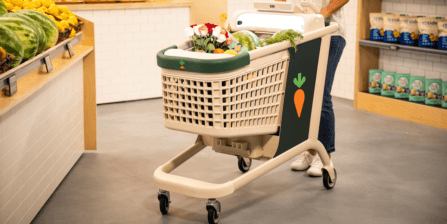
Caper
Why Smart Carts Are the Winning Technology Format for Grocers
One of the most common misconceptions about smart carts is that they only serve as an alternative to self-checkout. However, the real magic behind a Caper Cart, our AI-powered smart cart, is the digital screen.…...
Apr 9, 2024

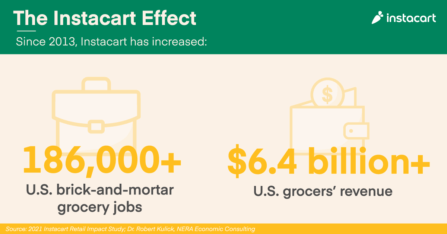 Instacart’s Impact on America’s Grocery Industry, by the Numbers
Instacart’s Impact on America’s Grocery Industry, by the Numbers 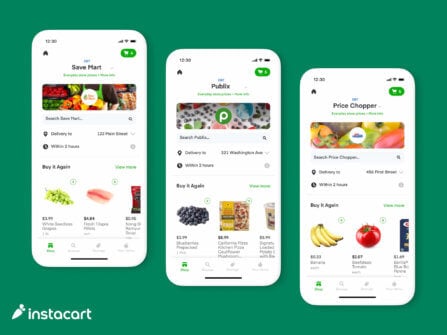 Breaking Down Barriers to Food Access with EBT SNAP Expansion
Breaking Down Barriers to Food Access with EBT SNAP Expansion  Beyond the Cart: A Year of Essential Stories
Beyond the Cart: A Year of Essential Stories 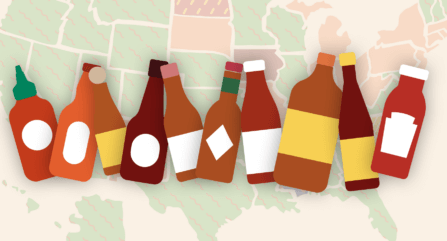 A Hot Take on America’s Favorite Hot Sauces 🌶
A Hot Take on America’s Favorite Hot Sauces 🌶  JuJu Smith-Schuster: What’s in my Cart?
JuJu Smith-Schuster: What’s in my Cart?  Introducing the First-Ever Instacart Emerging Brand List
Introducing the First-Ever Instacart Emerging Brand List 
